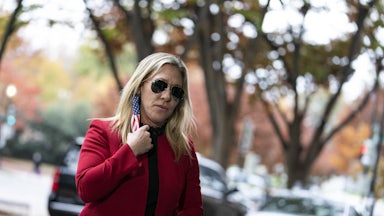Back in March, The New Republic’s readers were introduced to Marcus Orlando Flowers, one of a new breed of natsec-focused Democrats, leveraging their experience in the global war on terror to present themselves as warriors for democracy at home. Flowers, a 45-year-old Army veteran and military contractor who had served in Germany, Iraq, Afghanistan, and other outposts of American empire, told me that he had retired from military life and was ready to challenge his local congressional representative, the right-wing eccentric Marjorie Taylor Greene.
Running as a Democrat in a primary that currently features three other candidates, Flowers has emerged as the most distinctive: a swaggering, cowboy hat–wearing, Black veteran who can potentially appeal to his highly conservative district by bringing his war experience home. In his words, it is “mission critical” that he defeat Greene, whose Q-inflected sympathies he likens to the terrorists he fought overseas. That image—one that Flowers burnishes through tough talk on Twitter and Facebook—seems to be sticking. Aided by a flashy social media campaign and prominent endorsements from Georgia political luminaries like Andrew Young and Max Cleland, Flowers’s star has risen quickly. He’s already received more than $1 million in donations.
In early June, The New Yorker ran a Talk of the Town piece about Flowers being kicked out of a Greene event, the kind of headline-grabbing stunt that seemed all but assured to happen, given the circumstances. Written by Charles Bethea, the piece observed Flowers’s apparent calm as a very large security guard confronted him, and it ended with another one of Greene’s event staffers uploading a photo with Flowers to Facebook.
At no point did The New Yorker article—or coverage in the Atlanta Journal-Constitution, Yahoo News, or even previously in this magazine—discuss much of Flowers’s past. The congressional candidate has been a cipher by design, speaking in vague terms about his work experiences and personal life. “Not Blackwater” is a favored response when his military contracting is brought up. As for the scope of his duties, the words “logistics” and “procurement” were tossed around in a previous interview with The New Republic. But where has he been over the last 20 years? What did he do? Hard to say, though he did check in in Baghdad on Facebook on December 13, 2003. (Facebook wasn’t introduced until 2004, meaning Flowers applied the check-in retroactively.)
Additional research and reporting has allowed The New Republic to uncover more about Flowers’s past, including the names of his previous employers, and details about his tumultuous marriage to his ex-wife, a Russian national named Svetlana Chudinova whom he met in Afghanistan. Together, this new reporting shows that Flowers’s blanket secrecy may be in place for a reason. However complicated their lives, political figures are expected to abide by a certain amount of transparency and ethical conduct; it’s possible that Flowers’s actions fly in the face of these standards. Still, without the potential congressional candidate talking more candidly about his life, we may never know.
Some of the mystery surrounding Flowers’s life is simply strange. Perhaps it’s the culture of secrecy he emerged from as a figure from the military/military contractor milieu, but it’s not clear why he refuses even to name his previous employers—he’s mentioned the Department of Defense and Department of State but not any private contractors. That can be fixed now: According to a work history found online and later confirmed by his campaign, Flowers worked for DynCorp, a massive defense contractor that, last year, was purchased by a company called Amentum. He also worked at lesser-known contractors like the Research Triangle Institute and Parsons I&T. (A representative from Amentum refused to comment on whether Flowers ever worked for DynCorp.)
In the 2000s, Flowers ran his own small firm called Total Logistics Services, or Total Logistics, Inc. Registered in New Orleans and Alabama, the business appears to be defunct. It earned tens of thousands in contracts during the George W. Bush years, largely for translation services performed in Romania. Total Logistics Services was also required to pay back thousands of dollars to the Army, for reasons that are unclear in the available online contracting data, but such clawbacks can occur for various reasons, including if not all work is fulfilled. (According to Flowers’s campaign, “Total Logistics Services never received any disbursements under any contract that were later paid back.”) Reached for comment by phone, Katja Wimmer, who’s named as a partner in Total Logistics Services’ business filings and apparently once shared a home with Flowers, was surprised to learn that Flowers was running for Congress. After agreeing to an interview to take place the next day, Wimmer did not respond to further calls and messages.
Flowers’s hesitance to disclose his employment history is an odd choice, seeing as he’s running in a race against an opponent who’s already demonstrated a willingness to deploy a paranoid brand of politics, in which so-called “deep state” actors take on an outsize malevolence. Only after repeated requests did his campaign offer this statement about his work experience: “I spent several years working in logistics and procurement in combat zones. That included mentoring and training the Iraqi and Afghan National Army in how to safely move and account for equipment, people, and materials. That included at one point meeting with Afghan warlords to negotiate safe passage of critical infrastructure through territories under their control. It was an honor to be a small part of helping these brave Afghani’s and Iraqi’s [sic] stand up their new governments.”
In the clandestine world of military contracting—according to his campaign, Flowers maintains a Secret-level security clearance—that may be the most information the public is likely to get. But the details of the candidate’s personal life, which might make one reconsider a venture into politics, are far less shrouded.
In July 2016, Flowers was living in Oklahoma with Chudinova and their two-year-old daughter. Flowers and his ex-wife, who got married about a week before their child was born, had a tumultuous relationship marked by mutual recrimination and accusations of emotional abuse and infidelity. According to claims Chudinova later made in court filings, Flowers had tried to evict her several times. In Flowers’s view, Chudinova had been erratic and a neglectful mother.
On July 5, Flowers told Chudinova to accompany him to Walmart. Chudinova, who was not a U.S. citizen and had struggled to adjust to life in this country, took nothing with her. Instead of Walmart, they arrived at a homeless shelter, where Flowers told her to get out of the car. She refused; Flowers called the police. Eventually, Chudinova left the car and went into the shelter, the City Rescue Mission.
That was not the end of the dealings between Flowers and Chudinova. But it’s perhaps the most shocking known event from their relationship, and it’s one that Flowers doesn’t dispute: In court filings, he claimed that Chudinova was deceitful and a poor homemaker, and that he had consulted with the City Rescue Mission before dumping her there. Flowers claimed that Chudinova’s behavior—including allegations that she performed sex work—would jeopardize his security clearance. “I felt she had a personality disorder that was not previously disclosed,” he told a judge. He thought the Rescue Mission could help with counseling and housing.
After a series of court battles, Flowers has prevailed over Chudinova. The two are divorced, he retains primary custody of their child, and courts in Oklahoma and Georgia have repeatedly ruled in Flowers’s favor, despite accusations that he threatened to strike his wife, that he failed to help her secure citizenship, and that he refused to repay a $10,000 loan to Chudinova’s mother—all of which Flowers denied. Chudinova claimed at one point that Flowers forced her, under threat of deportation, to sign a divorce agreement; Flowers denied this and also said that he helped Chudinova renew her passport. Chudinova, who did not respond to requests for comment, claimed that she was extorted by one of her lawyers. Some of her court filings appear in broken English and without proper paperwork, which possibly stymied her custody fight. One judge also admonished and ruled against her for telling her daughter that Flowers was a liar, a moment that was recorded.
Last year, Chudinova posted a comment on a small Russian news outlet stating that it took her four years to earn a green card as a victim of domestic violence. According to a police report furnished by the campaign, in February 2017, a woman identified as “Azetelana”—who, the campaign claims, is Chudinova—called 911 regarding threats from the man she lived with after Flowers. Oklahoma state courts records also show that Chudinova received a protective order against the same man in 2017.
In posting to an obscure Russian media outlet’s comments section, Chudinova appears to have been desperate to find help but uncertain how to do so. In 2018 and 2019, she posted pleas on Facebook pages of celebrities like Oprah Winfrey and Judge Judy. “I want to find help to get my baby back,” she wrote. The posts included a murky video, almost four minutes long, in which Flowers grabs their daughter, who is screaming for her mother, and carries her out of the house. The video can appear distressing, but it is also difficult to follow. Flowers’s campaign produced a police report that it claimed showed that the event was a custody hand-off for which police were present, at Flowers’s request, as they were for other custody hand-offs. Since the video was not timestamped (it was posted in December 2018), it’s not possible definitively to tie it to the 2016 police report provided by the campaign. Despite a few supportive responses from strangers, Chudinova’s Facebook posts seemed to have no effect.
As recently as April of last year, Sandy Flowers, the veteran turned politician’s new wife, posted on Facebook that she needed a family law attorney in West Georgia. “The ex-wife is literally crazy,” she wrote. In previous court filings, Chudinova claimed that Sandy had lived with them before she and Flowers divorced. At one point, Chudinova claimed, Flowers threatened to strike her. Flowers has denied that he ever made such threats.
Friends and former colleagues of Flowers declined to speak on the record. While some of the grim details of Flowers’s former marriage have been confirmed by court records, much remains unknown about his personal and work history. It remains exceedingly strange that this deep state–like figure would expect to step into public life without opening his past to scrutiny. But if Donald Trump showed anything, it’s that today’s politicians can get away with far more than one might expect. It just takes some bravado, an indifference to consequence, and an ability tell a compelling story that your audience—in this case, Democratic Party machers hoping that there’s a magic kind of candidate who can evict Marjorie Taylor Greene from a deep-red district—wants to believe.








